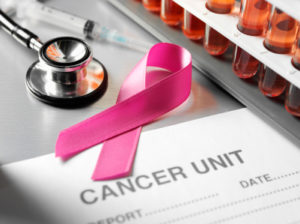 In Malaysia, breast cancer is one of the most frequently detected cancer among women. Based on the Malaysia Cancer Statistics 2006, 3525 female patients were registered into the National Cancer Registry. The number makes up 16.5% of the cancer cases registered in that year. There are several factors that makes one at risk of having breast cancer such as early commencement of menstruation (cycle begins at age < 12 years old), late menopause (cycle ends at age > 55 years old), nulliparity (never conceived a child), extended hormone replacement therapy (HRT) (exceeding 5 years), and birth of first child at the age above 30 years old.
In Malaysia, breast cancer is one of the most frequently detected cancer among women. Based on the Malaysia Cancer Statistics 2006, 3525 female patients were registered into the National Cancer Registry. The number makes up 16.5% of the cancer cases registered in that year. There are several factors that makes one at risk of having breast cancer such as early commencement of menstruation (cycle begins at age < 12 years old), late menopause (cycle ends at age > 55 years old), nulliparity (never conceived a child), extended hormone replacement therapy (HRT) (exceeding 5 years), and birth of first child at the age above 30 years old.
There is a tendency among supplement products and traditional medicine sellers to advertise their products as a cure for breast cancer. Often a product is said to have successfully healed breast cancer. The statement is supported by a testimony said to be from a product user claiming they are cured of the cancer they had. Other advertisements describe an anecdote, for example a story about a customer who drank pomegranate juice and later confirmed by a doctor that she is cured of stage 2 breast cancer (after vomiting blood).
A typical method used to market products that claim to cure breast cancer is by inserting rhetorical elements into their adverts. Rhetoric is the use of language and words to influence readers into trying their products. Among the most frequently used rhetorical method is inserting testimonies of those who have allegedly used the products, anecdotes (short stories) telling about the miracles of the product and using impressive scientific terminologies to seduce the reader into believing in the efficacy of the advertised products.
In reality, is it true that the products work and is able to cure breast cancer?
To address the question above, there are several issues that needs to be analysed by readers who wish to obtain the products such as in the advertorial above.
Firstly, breast cancer treatments that have been approved by the Ministry of Health are treatments that have been proven scientifically to cure the disease. For example, surgery to remove cancer tissues, chemotherapy (use of cytotoxic medicine to kill cancer cells) and radiation therapy. The products that have been advertised by the seller claiming to cure breast cancer do not have scientific evidence that would support the claims of the product’s capability to overcome cancer. Scientific evidence are studies of the effect of the product on patients through clinical trial.
Secondly, advertisement of a product that claims to cure diseases requires approval from the Medicine Advertisement Board, Ministry of Health Malaysia. Every advertorial that have been approved will be assigned an advertisement approval number, example : KKLIU/1234/ABCDE.
Third, advertising on any cancer treatment is illegal under Medicines (Advertisement and Sales) Act 1956. Section 3(1) of the act prohibits the advertising treatment or medication for any of the 20 types of diseases listed below:
- Diseases/defects of the kidney
- Diseases/defects of the heart
- Diabetes
- Epilepsy or fits
- Paralysis
- Tuberculosis
- Asthma
- Leprosy
- Cancer
- Deafness
- Drug addiction
- Hernia or rupture
- Eye diseases
- High blood pressure
- Mental illness
- Infertility
- Frigidity (disinterest in sex or difficulty in achieving orgasm)
- Impairment of sexual function or impotency
- Venereal disease (sexually transmitted disease)
- Nervous debility arising from or related to sexual intercourse
Those who are involved in advertising medicinal products without approval of the Medicine Advertisement Board or advertising products/services that claims to cure or prevent any of the 20 listed diseases above can be prosecuted in court. If found guilty, punishment for any of the offense is a maximum fine of RM3000 or imprisonment not exceeding a year or both on first conviction. For repeat offenders, a maximum fine of RM5000 or imprisonment not exceeding two years or both can be imposed.
In conclusion, products that are advertised to be able to cure breast cancer or any type of cancer cannot guarantee the healing of cancer as claimed. Breast cancer requires treatment and close monitoring by qualified medical practitioners. Therefore, consumers are reminded to not be easily influenced by false advertising that offers cure to diseases. Protect yourself from being a victim of fraud and the dirty tactics of product marketing.
Khairul Naim bin Zainal Abidin is a pharmacist based in the Ministry of Health Malaysia. This article is translated from the original piece at https://www.mmgazette.com/iklan-penawar-kanser-payudara-retorik-realiti-khairul-naim-bin-zainal-abidin/ by Nur Nadhirah.
References::
- Malaysia Cancer Statistics Data and Figure Peninsular Malaysia 2006.http://www.moh.gov.my/images/gallery/Report/Cancer/MalaysiaCancerStatistics_2006.pdf Retrieved on 17th October 2014.
Akta 290, Akta Ubat (Penjualan dan Pengiklanan) 1956.
[This article belongs to The Malaysian Medical Gazette. Any republication (online or offline) without written permission from The Malaysian Medical Gazette is prohibited.]
